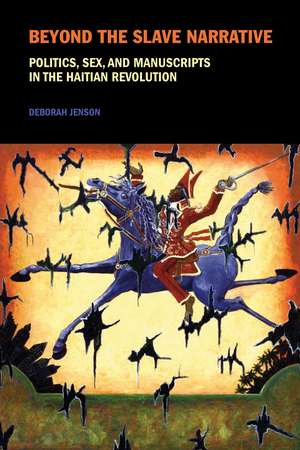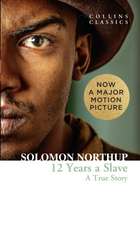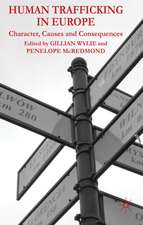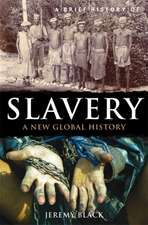Beyond the Slave Narrative – Politics, Sex, and Manuscripts in the Haitian Revolution
Autor Deborah Jensonen Limba Engleză Paperback – mar 2012
These Haitian French and Creole texts have been neglected as a foundation of Afro-diasporic literature by former slaves in the Atlantic world for two reasons: because they do not fit the generic criteria of the slave narrative (which is rooted in the autobiographical experience of enslavement); and because they are mediated texts, relayed to the print-cultural Atlantic domain not by the speakers themselves, but by secretaries or refugee colonists. These texts challenge how we think about authorial voice, writing, print culture, and cultural autonomy in the context of the formerly enslaved, and demand that we reassess our historical understanding of the Haitian Independence and its relationship to an international world of contemporary readers.
Preț: 435.08 lei
Nou
Puncte Express: 653
Preț estimativ în valută:
83.28€ • 90.49$ • 69.100£
83.28€ • 90.49$ • 69.100£
Carte disponibilă
Livrare economică 31 martie-14 aprilie
Preluare comenzi: 021 569.72.76
Specificații
ISBN-13: 9781846317606
ISBN-10: 1846317606
Pagini: 322
Ilustrații: Illustrations
Dimensiuni: 156 x 234 x 18 mm
Greutate: 0.57 kg
Editura: Liverpool University Press
ISBN-10: 1846317606
Pagini: 322
Ilustrații: Illustrations
Dimensiuni: 156 x 234 x 18 mm
Greutate: 0.57 kg
Editura: Liverpool University Press
Cuprins
Acknowledgements
Introduction: Race and Voice in the Archives: Mediated Testimony and Interracial Commerce in Saint-Domingue
Part I: Authorizing the Political Sphere
1. Toussaint Louverture, “Spin Doctor”? Launching the Haitian Revolution in the Media Sphere
2. Before Malcolm X, Dessalines: Postcoloniality in a Colonial World
3. Dessaline’s America
4. Reading Between the Lines: Dessalines’s Anticolonial Imperialisn in Venezuela and Trinidad
5. Kidnapped Narratives: The Lost Heir of Henry Christophe and the Imagined Communities of the African Diaspora
Part II: Authorizing the Libertine Sphere
6. Traumatic Indigeneity: The (Anti)Colonial Politics of “Having” a Creole Literary Culture
7. Mimetic Mastery and Colonial Mimicry: The “Candio” in the Popular Creole (Kreyòl) Literary Tradition
8. Dissing Rivals, Love for Sale: The Courtesans’ Rap and the Not-So Tragic Mulatta
Epilogue
Index
Introduction: Race and Voice in the Archives: Mediated Testimony and Interracial Commerce in Saint-Domingue
Part I: Authorizing the Political Sphere
1. Toussaint Louverture, “Spin Doctor”? Launching the Haitian Revolution in the Media Sphere
2. Before Malcolm X, Dessalines: Postcoloniality in a Colonial World
3. Dessaline’s America
4. Reading Between the Lines: Dessalines’s Anticolonial Imperialisn in Venezuela and Trinidad
5. Kidnapped Narratives: The Lost Heir of Henry Christophe and the Imagined Communities of the African Diaspora
Part II: Authorizing the Libertine Sphere
6. Traumatic Indigeneity: The (Anti)Colonial Politics of “Having” a Creole Literary Culture
7. Mimetic Mastery and Colonial Mimicry: The “Candio” in the Popular Creole (Kreyòl) Literary Tradition
8. Dissing Rivals, Love for Sale: The Courtesans’ Rap and the Not-So Tragic Mulatta
Epilogue
Index
Notă biografică
Deborah Jenson is professor of Romance studies, a Global Health Institute faculty affiliate, and codirector of the John Hope Franklin Humanities Institute’s “Haiti” Lab at Duke University.










